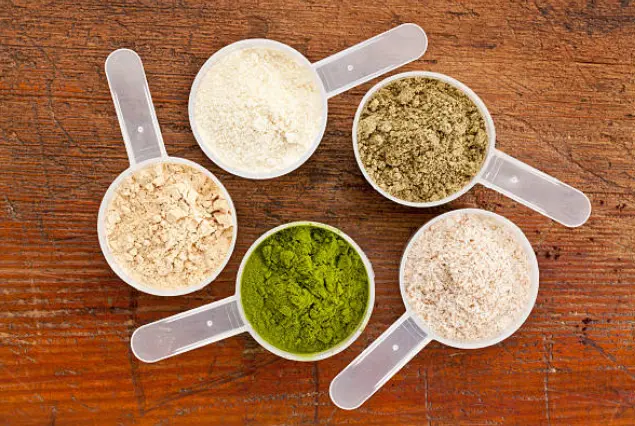Protein is one of the most necessary nutrients for weight loss. Getting enough protein may help your metabolism and decrease your appetite. It may also assist you in losing fat without losing muscle.
Protein powder is a convenient way to increase your protein intake and has even been shown to aid in weight loss. Here are some of the ways in which protein powder can play an important role in weight loss.
It helps in reducing hunger and appetite.
Protein has been shown to aid in the reduction of hunger and appetite. One important reason is that protein helps you feel fuller for longer than other macronutrients. This is because the fullness hormones GLP-1 and PYY are released.
Increasing your protein intake may also result in less hunger throughout the day, according to research.
In one small study, older women who ate a high-protein breakfast consumed up to 135 fewer calories later in the day than those who ate a low-protein breakfast or skipped breakfast.
Furthermore, according to another study, consuming more than 35 grams of protein at once appears to be the most effective for effects such as decreased hunger, decreased desire to eat, and increased feelings of fullness.
A small study of nine obese young women discovered that a whey protein drink actively reduced appetite. In another study, participants who were given a high protein shake before their workout reported feeling less hungry afterward than those who were given a lower protein shake with the same number of calories.
While the findings are encouraging, a variety of factors may influence the effect of protein shakes on appetite and hunger.
It helps in promoting healthy metabolism and lean muscle mass.
A high protein diet, especially when combined with strength training, can aid in muscle building.
Building muscle is a great way to keep your metabolism healthy because it aids metabolism and energy production. This is especially true if you are trying to lose weight by following a calorie-restricted diet.
This is because severe calorie restriction can cause muscle loss in addition to fat loss. This loss of lean muscle mass may slow your metabolism, making it easier to regain weight once you’ve finished the restrictive diet.
In contrast, eating enough protein and doing strength training may help prevent muscle loss and the resulting metabolic slowdown.

In a 13-week study of obese older adults, those who consumed an additional 20 grams of protein weekly (in the form of a shake) gained 2.8 pounds (1.3 kg) more muscle mass than the adults who consumed less protein.
Furthermore, in a 6-week study, participants followed either a low or high-protein diet that included shakes. Each diet had a calorie limit. Notably, those who followed the higher protein diet gained 2.4 pounds (1.1 kg) more muscle while losing 2.9 pounds (1.3 kg) more fat.
Your body also expends more energy digesting protein than it does fat or carbohydrates, so you burn more calories in the process. This effect, known as the thermic effect of protein, may provide a minor metabolic boost.
It helps in losing weight and abdominal fat.
Despite the fact that few studies specifically use protein shakes, researchers generally agree that high-protein diets are an effective way to lose weight and body fat.
In a 14-week study, women with overweight or obese were given a resistance exercise program in addition to high carbohydrate or high protein, calorie-restricted diet. The high protein group lost 1.7 times more body fat than the high carb group.
Women with normal weight but high body fat percentage followed either a high or standard protein diet for 12 weeks in a 12-week study. The high protein diet resulted in an additional 3 pounds (1.4 kg) of body fat loss and a 1-inch (2.2 cm) decrease in waist circumference.

Women in the high protein group also retained significantly more muscle mass than those in the low protein diet.
A recent review also suggests that following a high protein diet in the first 3-12 months after losing weight can help to reduce weight regain. A small study discovered that when people who were overweight drank low-sugar protein shakes as part of a diet plan, their weight loss improved.
It helps in overall body weight management.
Protein’s effects on metabolism, appetite, and muscle mass may help you avoid regaining weight after you’ve lost it.
According to one study, eating 25-30 grams of protein per meal appears to improve both weight loss and weight management. However, researchers warn that strict adherence to a high protein diet, as well as other lifestyle factors, is usually required.
Similarly, studies indicate that high protein diets result in less short-term weight regain after significant weight loss.
What Exactly Are Protein Powders?
Protein powders are concentrated protein sources derived from animal or plant foods such as dairy, eggs, rice, or peas.
There are three main types:
- Protein concentrates: Protein concentrates are produced through the extraction of protein from whole food using heat, acid, or enzymes. These typically contain 60-80 percent protein, with the remaining 20-40 percent made up of fat and carbohydrates.
- Protein isolates: An additional filtering process removes even more fat and carbohydrates, concentrating the protein even more. Protein isolate powders constitute 90-95% protein.
- Protein hydrolysates: Hydrolysates are more quickly absorbed by your body and muscles because they are produced by further heating with acid or enzymes, which breaks the bonds between amino acids.
In the case of whey protein, hydrolysates appear to raise insulin levels more than other forms. This can help with muscle growth after exercise.
Some powders contain vitamins and minerals, particularly calcium. These powders, however, do not benefit everyone. If your diet is already high in high-quality protein, adding protein powder is unlikely to improve your quality of life.
Athletes and people who regularly lift weights, on the other hand, may find that taking protein powder helps maximize muscle gain and fat loss.
Protein powders can also help people who struggle to meet their protein needs through food alone, such as the elderly, the sick, and some vegetarians or vegans.
Some of the various types of protein powder are:
- Whey protein is a dairy-based protein that is quickly absorbed and contains all nine essential amino acids.
- Casein protein is a dairy-based protein that is slowly absorbed and contains all essential amino acids.
- Soy protein is plant-based and contains all essential amino acids, as well as soy isoflavones, which may have some health benefits.
- Hemp protein is plant-based, contains all essential amino acids, and is high in omega-3 and omega-6 fatty acids.
- Rice protein is plant-based, but it contains less of the essential amino acid lysine.
- Pea protein is a plant-based protein that is less allergenic than soy and whey protein, but it is lower in the essential amino acids cysteine and methionine.

Certain protein powders and drinks contain a variety of protein sources. Many plant-based brands, for example, combine types to diversify the amino acid profile. Some dairy-based protein powders combine whey and casein to promote muscle synthesis both immediately and over time.
The best protein for you?
Different types of protein may have different effects on your body. Whey, for example, is typically absorbed faster than casein. As a result, it is ideal for promoting muscle protein synthesis following exercise. In the short term, it may also help you feel less hungry.
While some small studies have found that whey protein is more effective for weight loss than soy and other plant-based proteins, others have found no significant difference. The quality of the protein you buy is an important factor to consider.
Complete proteins include whey, casein, and soy. This means they have adequate amounts of all the essential amino acids your body requires.
Nonetheless, these three may cause allergic reactions in some people. Rice and pea protein are often considered less allergenic, despite the fact that rice protein is low in the essential amino acid lysine and pea protein is low in cysteine and methionine.
Hemp protein is also thought to be less allergenic. Furthermore, it contains adequate amounts of all essential amino acids. As such, it can be considered a complete protein source.
Choosing incomplete proteins in your protein shake is unlikely to be a problem as long as you consume a variety of protein sources on a regular basis. However, before incorporating new supplements into your diet, consult with a doctor or registered dietitian.
In conclusion
Protein powders are most commonly used to gain and build muscles but it can also help you to lose weight. Plant-based proteins such as soy and pea, as well as whey, casein, and egg proteins, are all excellent choices for people looking to lose weight. Some of these protein powders contain ingredients like caffeine and fiber that can help with weight loss.
Most adults can easily get enough protein from food without needing to consume protein powder. Protein powder, however, is an easy, safe, and delicious way to add extra protein to your diet.
Extra protein may help you feel less hungry if you’re trying to lose or manage your weight.
It may also aid in the maintenance of muscle and metabolism, as well as the reduction of the likelihood of regaining lost fat, especially when combined with a workout regimen.
While these products can help you lose weight, you’ll see the best results if you combine them with a well-balanced, low-calorie diet and exercise routine.
